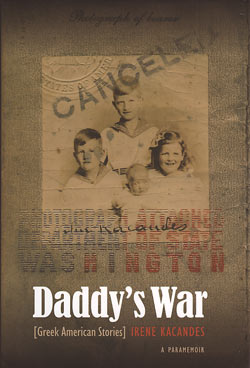Book Review: Daddy’s War: Greek American Stories
 Irene Kacandes tells the story of her family’s Second World War experiences – a story drawn from interviews with her siblings as well as her father in his old age. The parental interviews were obviously difficult, touching on subjects that her father may have thought were better off forgotten, and made even more difficult by his advancing dementia.
Irene Kacandes tells the story of her family’s Second World War experiences – a story drawn from interviews with her siblings as well as her father in his old age. The parental interviews were obviously difficult, touching on subjects that her father may have thought were better off forgotten, and made even more difficult by his advancing dementia.
Ms. Kacandes uses a grand combination of interviews (often transcribed exactly as they came from the taped conversations), photographs, documents, newspaper articles, maps, experiences and a thoughtful examination and analyses to weave a family memoir that is so much more than a memoir – she calls it a paramemoir.
Prior to the war, the author’s immigrant grandmother returned to her family in Greece, taking with her four young children. She had no idea the peril into which she was taking her family. The family became trapped in Greece, as the Nazis occupied the country. That set about a series of events in which the family struggled to survive. Her father, John, barely more than a child, found himself caught up in the struggle, even acting a messenger, and smuggling arms for the resistance. Being an American boy, he had been circumcised at birth, and at one point found himself being rounded up with those of Jewish background in Greece, and taken to a camp in preparation for transfer to Poland and certain death in the Nazi extermination camps. However, he was rescued and survived. The family lived out the war, and eventually returned home to America.
I’ve read many stories of war – everything from medieval to Vietnam, and found this story to be unique – unique in the way that it was compiled, data analyzed, and written.
Family historians spend countless hours interviewing relatives, some elderly with faltering memories – others with memories sharply intact while their bodies wither. There is typically a give and take in the interview process. We are often forced to negotiate with the interviewee, a negotiation process that may or may not result in the “the truth,” whatever that is… Ms. Kacandes was a master in the negotiation process with her father, enabling her to write a book, useful not only for its family and wartime history, but as a model of how the process can be repeated by others.
The book is a great read, especially if you’re interested in WWII and/or the holocaust. I also recommend it as a skillful example for how a superior memoir can be written – keeping in mind that genealogists often combine the memories of their family members within their own memoirs.
The volume includes several appendices including Greek naming patterns, family trees, maps, chronology, glossary, and references.
The author is a professor of German and comparative literature at Dartmouth College in Hanover, New Hampshire, and is the author of several other books.
By Irene Kacandes; 2009; 6×9; 408 pp; hardbound; 51 illustrations; dustjacket; ISBN: 978-0-8032-1933-5; Order from the publisher at: University of Nebraska Press, 1111 Lincoln Mall Ste. 400, Lincoln, NE 68588-0630; 402-472-3581; www.nebraskapress.unl.edu ; $29.95 plus postage.